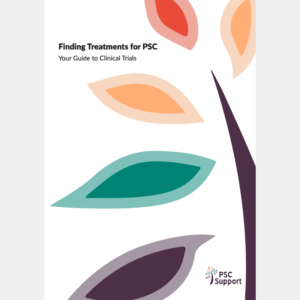SPRING Clinical Trial Update
SPRING Clinical Trial
New data released
Promising results have been reported by the pharmaceutical company, Chemomab, at an international liver research meeting in Washington DC this week, following a 48 week extension of a Phase II trial called SPRING, which is assessing the drug Nebokitug in the treatment of PSC.
Nebokitug
Nebokitug is a specific type of medicine, known as a monoclonal antibody, designed to work against a protein in the body called CCL24. This CCL24 protein is thought to be a key driver of the damage and scarring seen in PSC.
The extension followed the SPRING Phase II trial, which was a 15 week randomised controlled trial where participants took either nebokitug or a dummy drug called a placebo. The vast majority of participants who were eligible for the open label extension enrolled in this further study, and took either 10mg or 20mg of neboktiug per kg of body weight for 48 weeks.
Key Results of the SPRING Trial
The data highlights three key areas: safety, lasting benefit, and impact on the disease itself.
Safety and Tolerability
Nebokitug appeared safe and was well tolerated by participants for the full 48 weeks of treatment. They found no new safety worries or signals during this extended part of the trial.
Sustained Improvements in Scarring and Swelling
The positive effects of nebokitug lasted in the 48 week extension. These long lasting benefits meant participants showed stable or continued improvements in markers used to assess inflammation and scarring in the liver. These improvements were seen especially in patients with moderate/advanced disease receiving the 20mg/kg dose of nebokitug.
Understanding How Nebokitug Works
The latest results shed light on how the drug changes the disease. Nebokitug works by targeting immune cells called macrophages, which are involved in PSC progression.
Nebokitug cut down a number of proteins associated with harmful macrophage actions, with the higher dose (20mg/kg) having a stronger effect.
It also led to a notable increase in a key protein called MST1, and again the effect was stronger with the higher dose.
MST1 is important because it helps control inflammation, and levels of MST1 are known to be lower in people with PSC than in healthy individuals. This increase in MST1 was associated with greater improvements to markers of liver scarring as measured with non-invasive tests including a Fibroscan.
These findings suggest that nebokitug may be modifying the disease process by specifically changing the activity of immune cells in patients with PSC.
What Are the Next Steps for the Research?
The results from the SPRING trial provide strong support for the continued evaluation of nebokitug.
The next major step is to test the 20 mg/kg dose in a larger study called a Phase 3 clinical trial.
The development of nebokitug already benefits from regulatory support, as it has received Orphan Drug designation from both the US Food and Drug Administration (FDA) and the European Medicines Agency (EMA), and Fast Track designation from the FDA for PSC treatment. These designations are given to medicines that treat serious conditions with high unmet needs, and they can help speed up their development.
Previous SPRING announcements:
If you'd like to learn more about clinical trials, what's involved and what the various terms mean, order our free Clinical Trials Guide.

